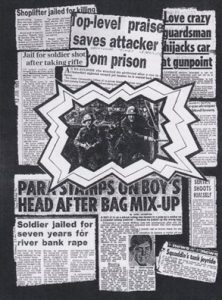Lynda La Plante & her TV Drama, Civvies by Aly Renwick
In Britain, anyone raising the issue of combat veterans who are suffering from psychological problems, or who carry out violent acts in Civvy Street after their tours of duty, can expect to face hostility from the military establishment. The Defence Ministry even take umbrage about newspaper articles, and especially TV programmes, that touch on the problems that many veterans go through. In 1992, Lynda La Plante’s TV drama, Civvies, was a good example of this occurring.
La Plante, a former actress, is an award-winning author and screenwriter, who is best known for writing the Prime Suspect TV crime series, which starred Helen Mirren as DCI Jane Tennison. In 1993 and 1994, La Plante received two Emmy Awards for Outstanding Mini Series for Prime Suspect and in 2001, she was presented with a BAFTA – the Dennis Potter Award – for television writing. In 2008 La Plante was awarded a CBE in the Queen’s Birthday Honours List for services to Literature, Drama and Charity.
Previously, in 1992, La Plante had written Civvies after some ex-Para Northern Ireland veterans had done some building work in her home and told her about themselves. Civvies was based on the violent lives of these Para-veterans as they tried to adjust to their return to Civvy Street. It was first published as a paperback, then became a TV series.
Towards the end of 1992 the Guardian newspaper published an interview with the director of the Civvies TV series, Karl Francis, who said he believed that: ‘Civvies reflected a much bigger real life story, which had yet to be told’. And that as a self-styled radical film maker, Francis admitted to finding the theme of Civvies a challenge:
“Instead of looking at the hearts and minds of the communities the soldiers have tried to conquer, it looked at the minds of the soldiers themselves – trying to conquer their own demons and live with them afterwards. ‘I’ve got cousins and friends who’ve been in the army’, he says. ‘I’ve heard how they try and deal with the stress – their wives have told me. I’ve met the soldiers who ended up pill-poppers and drug addicts. I’ve listened to the awful stories of their dreams. People respond to soldiering in different ways. Being a soldier doesn’t make you a good or a bad person. The lads in Civvies came out of the army still fighting, they were all wounded emotionally, they wanted healing’. He does not lean towards sentimentality: ‘They were screwed up. And yes, they were victims. But they dished it out as well, and if you deliver hell, sometimes it comes around on you and you have to live with it’.”
[Guardian, 4th Nov. 1992, The mind as combat zone, by Martin Collins]
Lynda La Plante had made friends with the group of ex-Paras she had based her drama Civvies on, and she tried to help them settle back into civilian life. By the time the show was broadcast on TV, however, every single one of the soldiers she’d met and found jobs for was in prison. La Plante then stated: “It made me deeply angry … the show was an angry plea to the Government to do something about PTSD.”
Civvies proved to be La Plante’s most difficult and controversial series. Because, while her subsequent work received widespread acclaim, Civvies was denounced by the military establishment. It was described as ‘offensive’ by the Defence Ministry, and as ‘inaccurate, belittling and will demoralise the troops’ by the Parachute Regiment.
Later, Lynda La Plante answered back at these critics: “Civvies is an open wound … Nothing in Civvies hadn’t happened. It wasn’t a fictional drama. It was fact, all of it. Yet I was vilified and abused by everybody.” [Observer Life, interview by Andrew Billen, 10th March 1996].
In the Observer interview La Plante also mentioned: “The shoals of letters I still get: ‘That was my brother, that was my father, that was my uncle, that was my husband’.” The military establishment wants the problems that are suffered by many veterans – like PTSD and/or installed aggression – to remain hidden. But, in the screen depiction of the Para-veterans in Civvies, many viewers had seen aspects of their own family members traumatised and often violent behaviour, after they had returned from tours of duty in Northern Ireland.
You can view some of the action from Lynda La Plante’s TV drama Civvies here:
https://www.youtube.com/watch?v=v1gLKHTlKaQ
Article by Aly Renwick, who co-founded Veterans In Prison with Jimmy Johnson. Aly served for 8 years in the British Army (1960-8).

